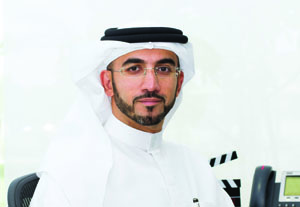Jamal Al Sharif, Managing Director of Dubai Studio City, spoke to BroadcastPro ME about the entitys current projects and future plans on the sidelines of the official launch of the regions first sound stage in partnership with MBC Whats on offer at the first completed sound stage? Dubai Studio City has partnered with MBC on […]

Jamal Al Sharif, Managing Director of Dubai Studio City, spoke to BroadcastPro ME about the entitys current projects and future plans on the sidelines of the official launch of the regions first sound stage in partnership with MBC
Whats on offer at the first completed sound stage?
Dubai Studio City has partnered with MBC on the sound stage project, which entitles MBC to use the facility independently. While we provide the infrastructure, they bring in the knowhow and use the sound stage on a long-term lease of five years. MBC has introduced Stargate technology in the sound stage, which is being seen as a tremendous push for the local film and TV industry.
The other aspect of our partnership entails local content generation, which will be done by filming four TV dramas yearly i.e. twenty of them during the leasing period. In return, we offer soft incentives worth USD 272,257 (1 million AED) by way of fee waivers and subsidised offerings. The sound stage will be leased out by MBC to third parties when not in use.
MBC has already completed the filming of one drama, which was fully shot in Dubai but the shoots were mainly done outdoors. Dubai-based crew and local production companies were hired to do this series. Now with the sound stage officially launched, MBC starts filming its second drama from September 1. It is a very interesting drama and will recreate another country right here in the sound stage. Thats all I can disclose at the moment.
What is special about this sound stage?
This is the first of the three sound stages announced earlier this year and covers a sprawling 25,000 sqft. MBC has brought in Stargate technology in this sound stage for the first time in the region. Stargate has five locations around the world and we are indeed proud to say that Dubai is one of them.
We have made a significant investment to prop up the film and TV industry in the UAE and the sound stage project is an essential part of that objective. We are committed to establishing a world-class filming hub in Dubai and have invested close to USD 272,257,000 (1 billion AED) to realise that vision. The investment has gone into infrastructure, boutique studios, office spaces and so on.
Tell us about the other two sound stages? What do they offer and what are their highlights?
The other two sound stages are also a commitment by TECOM to support the local film and TV industry. Their size and capacity makes them ideally suited for film shoots. However, they will be available for television shoots as well. Spread over an area of 50,000 sqft., these are the largest in the Middle East. An elephant door separating the sound stages gives flexibility to filmmakers to shoot two films simultaneously or use the entire space for a single shoot. The facility is sound proof and built with state-of-the-art technology to provide the latest facilities to filmmakers. Any amount of noise in the vicinity will not disrupt shooting in these facilities with 100% omissions of vibrations as well.
Yet another highlight of these sound stages are the two water tanks each of which is 8m x 20m. One of them is 41.2m deep, while the other one is almost 3m deep. This is the first time that such huge water tanks have been built indoors.
How about the shooting schedules at these facilities? Have you roped in any companies?
We will launch the second and third sound stages in September 2013, beginning with the shooting of a very large TV show. The facility has been booked already for 103 days and subsequently for another 95 days for a film shoot.
We know for sure that there is a huge demand for these facilities but we are a little picky about who gets to use them. We are not looking at long-term leases at the moment so that the facility is available to more than one company. We want everyone to benefit from them and not limit their scope to just a handful of entities.
In fact, we are in the process of negotiating more deals similar to the MBC deal. There have been enquiries for more such facilities from Egypt and Lebanon, and we are looking at these requests quite seriously. We are in talks for expansion plans to build customised studios for companies.
There is enough room to build up to 14 sound stages of 50,000 sqft. capacity in Dubai Studio City. We have already engaged two investors to build three- and four-star hotels.
What is the current occupancy rate in Dubai Studio City?
Dubai Studio City is 100% occupied. Our 18 boutique studios and office spaces have also been leased out.
What are the typical challenges that you face in your day-to-day dealings with film and TV entities and productions houses?
Filmmaking is challenging. Having said that, anyone working in this field accepts them as part of the job and takes them in their stride. We have been fighting cynicism from the day we decided to establish Studio City, and the Film and TV Commission. We have defied people who thought we were crazy to build studios in the middle of the desert. Figures prove that there is a huge demand for our facilities and it is only increasing by the day.
There are 342 companies operating from Dubai Studio City, out of which 190 are production houses and ancillary companies related to production, with 45 production support services companies and about 40 broadcasters.
We have 17 TV channels broadcasting from Dubai Studio City in addition to 171 from Dubai Media City making a total of 188 channels broadcasting from Dubai.
How far has Dubai Film and TV Commission been successful in encouraging local talent?
We are working with filmmakers providing logistics, and incentives in addition to organising networking events every quarter to address their issues. Studios are available for them to shoot on special rates.
Local filmmakers primarily want to show Dubai and we are willing to extend whatever help we can in that direction. In terms of encouraging local talent we have made a beginning, albeit small. We try to bring out the best of the local talent, for instance, all of my corporate videos are done by emerging Emirati filmmakers.
How has Dubai Studio City fared so far?
Going by the current figures, I think we have managed to achieve a fair degree of success. Having said that, we are not resting on our laurels just yet as we believe there is a huge potential waiting to be tapped. Producers have gained major savings on their estimated budgets through our incentive schemes and waivers.
There was mention of a directory launch what will that cover? Can we also expect to see changes to the DFTC web site?
We have hired a very competent local company to compile a directory for us. This will be ready in time for the tenth anniversary of Dubai International Film Festival, which is hosted at the end of the year. The listing will include production companies, rental houses, logistical support companies, OB vans, cabling companies, studio owners, even caterers and tailors, and all kinds of ancillary services related to production. It will be a useful resource for those who want to use our facilities to film in Dubai.
Companies are welcome to advertise as this directory will get worldwide exposure through an established network of Dubai Tourism and Commerce Marketing (DTCM). With twenty offices around the world, DTCM will distribute the directory to ensure it gets visibility in relevant quarters. We are also in talks with the Ministry of Interior to contact all UAE embassies and consulates around the world and distribute copies of the directory to them as well.
The print version of the directory will be in English but our online version will be in both Arabic and English. We also have plans to expand the listing in other languages. The online version of the directory will have English and Arabic to start with and then include other languages in time.
Our web site now has a Mandarin option as well. Chinese filmmakers are showing keen interest in Dubai and we have successfully hosted some very prestigious Chinese projects here, plus there are more in the pipeline.
What are the major roadblocks that the film fraternity in the region faces today and what steps are you taking to counter them?
We feel the lack of local crew is a drawback for us. We have the latest technology and world class facilities to film but we need to build our human resources. We need more local crew to support shooting here so that we have to import less.












































































